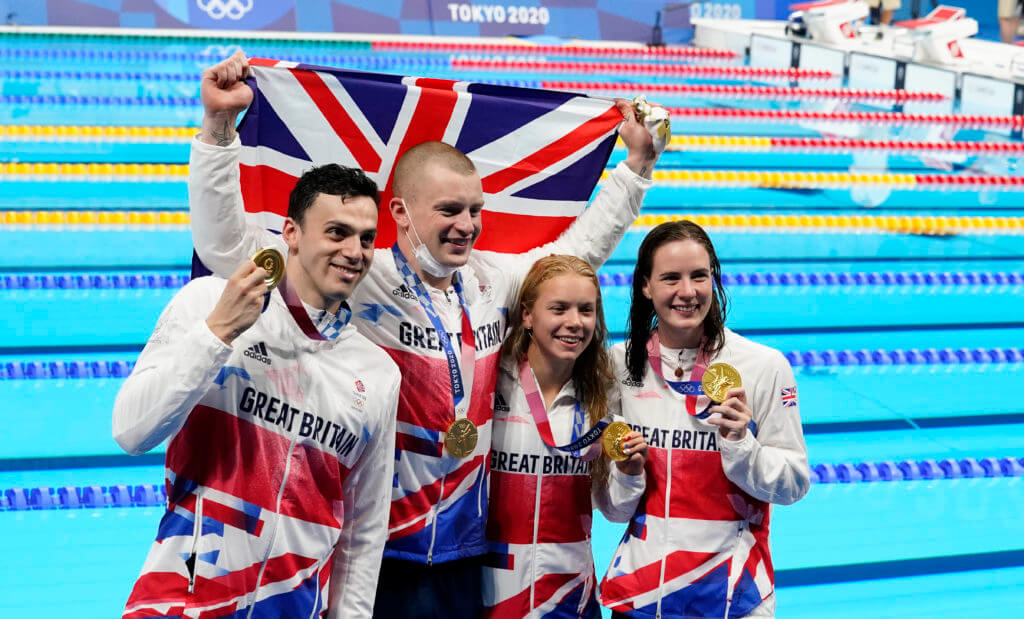Tokyo Flashback: Adam Peaty Fuels Great Britain to Inaugural Gold in 400 Mixed Medley Relay (Updated)

Editorial content for the 2021 Tokyo Olympic Games coverage is sponsored by GMX7.
See full event coverage. Follow GMX7 on Instagram at @GMX7training #gmx7

Tokyo Flashback: Adam Peaty Fuels Great Britain to Inaugural Gold in 400 Mixed Medley Relay
One year has passed since the Olympic Games, delayed by a year due to COVID-19, unfolded in Tokyo. To celebrate what went down in the Japanese capital, Swimming World is revisiting the championship finals – each on their one-year anniversary – by once again running the stories that were posted after the medals were decided.
It’s been a strong week for Great Britain, and now it has an inaugural Olympic title to take home to Europe.
Putting together the right pieces, and in the right order, the British secured the gold medal in the 400-meter mixed medley relay at the Tokyo Games, setting a world record in the process. The quartet of Kathleen Dawson (backstroke), Adam Peaty (breaststroke), James Guy (butterfly) and Anna Hopkin (freestyle) posted a time of 3:37.58. That mark obliterated the previous world record, set last year by China at 3:38.41.
China claimed the silver medal in 3:38.86 while Australia, with Emma McKeon anchoring, grabbed the bronze medal in 3:38.95. It was the fifth medal of the Games for McKeon, who has two events on the final night of competition and can become the first female swimmer to win seven medals in a single Olympiad. Fourth place went to Italy in 3:39.28, followed by the United States in fifth in 3:40.58.
Great Britain’s relay gold was its second of the week, complementing the victory by the men’s 800 freestyle relay. Prior to Tokyo, the last time a British relay won an Olympic title was at the 1912 Games in Stockholm. This latest triumph was dominant, the four legs perfectly assembled and playing to the team’s strengths.
After Dawson led off in 58.80, Peaty came through with a game-changing split of 56.78, an effort nearly a second quicker than anyone else in the field. Guy backed up Peaty with a 50.00 butterfly split, clearing the way for Hopkin to anchor without pressure. All she did in her role was split 52.00, a career best.
“In one word, it’s inspiring to be part of the team which is always looking for the one percent, always looking for more,” Peaty said. “We came together as a team and hopefully now this is a catalyst, not only for this Games, but through to the next Games and the one after that. There’s no point in British swimming being in such a great position if we’re not going to inspire the next team to do it. It’s absolutely incredible. I never thought that one day I’d be a three-time gold medalist at the Olympics. It’s a fun event and that’s what sport needs. It needs to be fun.”
Contested three times at the World Championships, beginning in 2015, the mixed medley relay was ne of three events added to the Olympic slate for Tokyo. The other two were the men’s 800 freestyle and women’s 1500 freestyle, giving the male and female genders matching programs. Great Britain obviously got the chemistry correct for the relay debut at the Games.
Unlike the mixed freestyle relay, which is an event at the World Championships and almost always features the male swimmers on the front-two legs to get into clean water, the mixed medley involves greater strategy. Off the deck, coaching staffs crunch numbers to determine their fastest lineups while considering the opposition’s strengths and weaknesses.
The result? An ever-changing tussle.
If there is a common thread in the mixed medley, it is teams’ penchant to use a male breaststroker. Because the stroke is the slowest of the four, coaches figure the greatest percentage of time can be made up on that leg. In the final, only the United States went with a female breaststroker, Olympic champion Lydia Jacoby. Her leg was a struggle, as her goggles slipped down on the dive and she was forced to race without clear vision. Jacoby still posted a 1:05.09 split, and the equipment malfunction did not cost the U.S. a place on the podium.
The problem for the U.S. was the makeup of the team. Without a dominant male breaststroker, an issue due to Michael Andrew’s struggles this week, the American coaches opted to veer toward an unconventional lineup by the event’s standards. The U.S. turned to a relay of Ryan Murphy, Jacoby, Torri Huske and Caeleb Dressel, who was racing his third event of the night. That team was never in the mix.
While China was second from the second leg through the finish, Australia needed a big effort from McKeon on the anchor leg to reel in Italy. The veteran delivered, splitting 51.73 to overhaul Federica Pellegrini, who was 52.70.
Great Britain will be remembered for its achievement.
“It’s about going through your own race process and not really focusing on what team’s putting in what gender (on which leg),” Dawson said. “I could have gone against two females, two males, it didn’t really matter. I just had to go through my own race. I am super proud of the whole team. They’ve all done so well.”
Mixed Medley Relay
World Record: China (Xu, Yan, Zhang, Yang) 3:38.41 (2020)
Olympic Record: New Event
Final Results
1. Great Britain, 3:37.58
2. China, 3:38.86
3. Australia, 3:38.95
4. Italy, 3:39.28
5. United States, 3:40.58
6. Netherlands, 3:41.25
7. Russia, 3:42.25
8. Israel, 3:44.77




